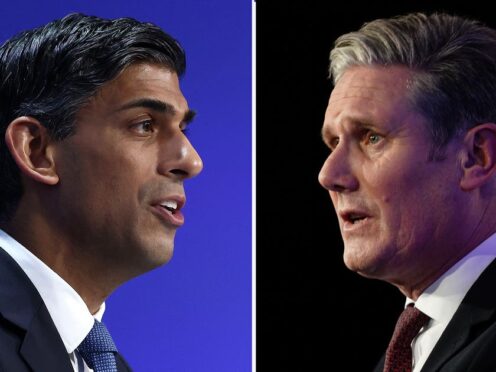Labour’s plans for climate and nature have scored four times higher than the Conservatives, according to an analysis of party manifestos carried out by green groups.
Friends of the Earth and Greenpeace UK teamed up to evaluate the plans against 40 policy recommendations published last autumn by the organisations.
In the results, published on Monday, the Green Party and Liberal Democrats topped the rankings scoring 39 and 32 respectively by committing to much greater ambition.
The Labour Party came in third with 21 and the Conservatives came in last with just five points out of 40.
But the green groups are still calling on all political parties to strengthen their green policy packages if elected.
They are urging politicians to ensure the UK delivers on upcoming nature and climate targets and fully reaps the economic rewards offered by the green transition.
The manifesto scores were broken down into four categories, climate and energy, homes and transport, nature and environment, and justice and democracy.
For stating its intention to reduce the UK’s dependence on oil and gas and boost renewables, Labour scored particularly well, the green groups said.
But the party did not commit to the scale of funding needed for greener farming, cheaper public transport, or to upgrade cold, carbon-leaking homes as fast as is needed, it added.

Meanwhile, the Conservative Party’s manifesto doubled down on attempts to make climate and nature a wedge issue by committing to licence new fossil fuels on an annual basis and ban cleaner air measures like Ulez.
The Greens and Lib Dems pledged to raise billions more in taxation to fund areas such as improving public transport and additional support for international development.
Both also suggest they are prepared to borrow more to fund home energy efficiency upgrades, the switch to electric heating and nature restoration – all of which would create thousands of new jobs across the UK and in many instances reduce the cost of living and increase economic growth, the green groups said.
The Lib Dems offered a stronger plan than Labour on sewage pollution through levers such as taxing water company profits and setting more stringent legal targets, they added.
But unlike Labour, the party failed to commit to ending new oil and gas projects.
The analysis and ranking comes ahead of Wednesday’s head-to-head debate between Rishi Sunak and Sir Keir Starmer on BBC One, and with just ten days to go until polling day on July 4.

During the election campaign, environmental campaigners have complained that the climate and nature crises have not featured as a priority issue despite being a major concern among the population.
Rebecca Newsom, Greenpeace UK’s head of politics, said: “While the Greens and Lib Dems showcase what can be done to deliver a green and prosperous future with enough political will, it’s the stark chasm between the two main parties that’s most telling.
“Labour set out a clear vision for a bright future with lower bills and clean energy, while generating hundreds of thousands of jobs and cutting emissions – helping to tackle the climate crisis.
“Meanwhile, the Conservatives’ divisive proposal will deliver the very opposite.”
Mike Childs, Friends of the Earth’s head of policy, said: “With the UK veering so dangerously off track for meeting its climate targets under the Conservatives – whose manifesto is so distinctly lacklustre it’s almost laughable – it’s encouraging that Labour is 100% committed to delivering on the internationally agreed goal to reduce emissions by more than two-thirds by 2030.
“This is vital if the UK is to play its part in the global effort to avert runaway climate breakdown.

“But to do so, Labour must develop additional policies to those in its manifesto and come up with a robust strategy for funding vital measures to make sectors like farming and housing greener.”
Responding to the analysis, Green Party Co-Leader Carla Denyer said: “Labour’s green policies are bitterly disappointing, even in the context of the dire Conservative offering.
“Every single Green vote on 4th July will push the Labour government to be bolder and better on important issues – no more so than on the environment.”
Tim Farron, our Liberal Democrat Spokesperson for the Environment: “The Conservatives have displayed an appalling record on climate change and the natural environment.
“The Liberal Democrats have a serious plan to clean up our waterways, protect our natural environment and tackle the climate emergency: from establishing a tough new water regulator and expanding Blue Flag status swimming areas, to setting binding targets against the decline of our natural environment and rolling out an emergency home insulation programme.”
